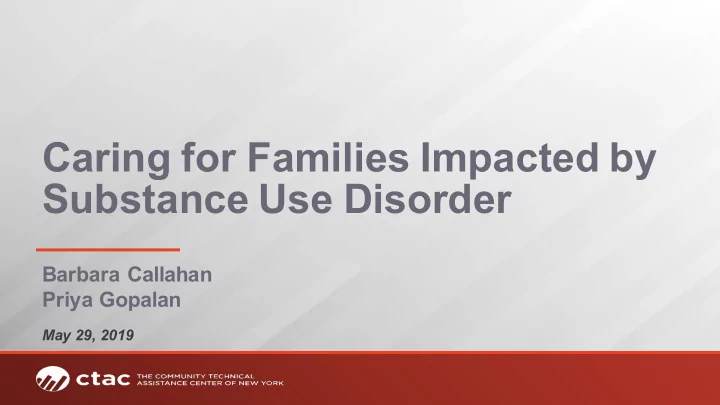

Caring for Families Impacted by Substance Use Disorder Barbara Callahan Priya Gopalan May 29, 2019
Agenda ‣ Family Engagement in SUD treatment ‣ Benefits and Barriers in engaging families ‣ Supporting families ‣ Resources
Substance Use Disorders Family Services in Treatment Substance Use Disorder is a chronic disease and complex brain disorder which impacts behavior and health with serious negative consequences for the individual, family and community. Large “treatment gap” exists due to lack of access, stigma and the need for greater awareness.
Why include families? ‣ Moving from an individual focus to a “systems” or family focus is like “zooming a camera lens from close-up to wide-angle view”. ‣ Family-centered approach provides context, leads to effective intervention, improves outcomes and sustains recovery for the individual. ‣ Family environments can be a great support in recovery and can also be a source for triggers. McCollum, E. E., & Trepper, T. S. (2014). Family solutions for substance abuse: Clinical and counseling approaches . Routledge.
How SUD affects a family Physical Financial Substance Use Disorder Social Emotional
Emotional reactions to Substance Use Disorder Fear Distrust Anger Denial Blame Distance Negative emotions stem from stigma and can be expressed by both family members and the person suffering from SUD Center on addiction.org/addiction/addiction-risk-factors www.hazeldenbettyford.org
Recovery Capital Framework All internal and external resources that can be drawn upon to initiate and sustain recovery Family/ Social Personal Community relationships Individual assets Cultural resources
How can families help their loved ones in recovery? ‣ understanding the trajectory of substance use disorder (the cycle of relapse and recovery) ‣ crisis intervention ‣ navigating systems and finding resources ‣ providing background and contextual information to treatment ‣ motivating change in behavior/ encouraging steps to recovery/ setting an example/ being optimistic & positive. ‣ caregiving; learn to be loving but firm ‣ supporting recovery emotionally ‣ supporting physically (housing etc. in early recovery) ‣ advocacy for family members
Questions providers can ask How will this help my client ? Adult clients Adolescents Who is the family? What is family-driven care? And whom does it apply to? What type of family engagement is best suited to the context? Psycho-education Therapy Peer Support groups
Barriers to family involvement in treatment Family Barriers Provider Barriers ‣ Belief that “Its our fault”! ‣ Insufficient time ‣ Guilt, shame, fear, stigma ‣ Lack of experience with ‣ Past failures and family engagement ‣ Past experience with experiences ‣ Lack of knowledge about families ‣ Client consent treatment options
Provider tips for Family Engagement ‣ Involve clients in identifying their “family” ‣ Active outreach to connect and keep the family informed of resources and supports ‣ Provide relevant psychoeducation to build awareness ‣ Build trust and alliance with client and family ‣ Instill hope and optimism; focusing on the present and future ‣ Use strengths-based tools and language in sessions ‣ Encourage family communication and healing ‣ Provide Family Therapy or refer externally
Strategies for Providers ‣ Explore experiences, concerns and questions ‣ Facilitate individual assessments if needed ‣ Keep an open mind and do not label family! ‣ Use appropriate language and de-stigmatize ‣ Reduce emotional burden by opening up communication, managing negative reactions and building positive coping skills
Family Therapy as a Tool ‣ Know the difference between family-involved therapy and family therapy ‣ Use trauma-informed perspectives on addiction and impact on family function ‣ Various models of evidence-based family therapy used in SUD Family involvement can strengthen and extend treatment benefits * as well as improve family relationships and prevent relapse. NIDA Principles of Drug Addiction treatment: Research based Guide (2018)
Q&A ‣ Please submit your questions into “ALL PANELISTS” in the chat box on the right side of your screen. ‣ To open the chat panel, click on the “speech bubble” at the bottom of your screen.
Helpful Links for Family and Friends of Addicts Alternative to 12 step programs: Smart Recovery (www.smartrecovery.org/community) Couple recovery.org : Supporting partners Al-Anon.org (al-anon.org) For family members of alcoholics Nar-anon (nar-anon.org) For family members of addicts Gam-anon (gam-anon.org) For family members of gamblers Coda.org (coda.org) For co-dependent individuals Adult children.org (adultchildren.org) For adult children of alcoholics www.drugfree.org [see Parent Coaching] Help & Hope by Text (text JOIN to 55753) [receive evidence based skills to help your child]
Resources for Providers helping Families Engagement Checklist for Providers click link to see Alternatives to 12 Step Programs : https://www.stoutstreet.org/blog/2017/08/23/alternatives-12-step-programs/ https://www.cigna.com/assets/docs/behavioral-health-series/substance-abuse/2013/oct-2013-drug-and-alcohol- seminar-handout.pdf SAMHSA’s Treat Improvement Protocol for Substance Abuse Treatment and Family Therapy https://store.samhsa.gov/system/files/sma15-4219.pdf Changing the Language of Addiction https://www.whitehouse.gov/sites/whitehouse.gov/files/images/Memo%2020Changing%20Federal%20Terminology %20Regrading%20Substance%20Use%20and%20Substance%20Use%20Disorders.pdf CRAFT (Community Reinforcement and Family Training) https://www.apa.org/pi/about/publications/caregivers/practice-settings/intervention/community-reinforcement http://www.bhevolution.org/public/iddt_family_education.page Center for addiction and Partnership for drug free kids www.centeronaddiction.org/treatment/resources-parents- families-caregivers Online and Print resources from Center for Motivation & Change https://motivationandchange.com/online-and-in- print-resources/
Upcoming Events ‣ Empowering Recovery and Resilience with Mindfulness • Thursday, May 30 – 12 PM ‣ Engaging Youth at Risk for Psychosis • Thursday, June 13 – 1 PM ‣ Complex Trauma Throughout the Lifespan: Considerations for Practice to Support Healthy Aging • Wednesday, June 26 – 1:30 PM
Thank You! For any further questions, please contact ctac.info@nyu.edu.
Recommend
More recommend